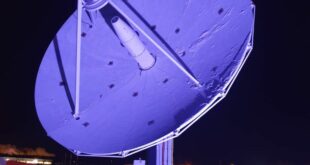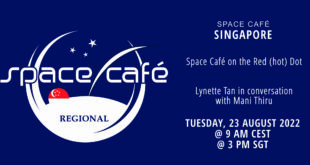
The Netherlands Organization for Applied Scientific Research (TNO) and Dutch space company Hyperion Technologies have successfully commercialised a key optical component to receive satellite laser links on Earth. The jointly developed Gigabit Detector will benefit operators of optical ground stations worldwide.
As of 7 May 2020, Hyperion offers the Gigabit Detector to the worldwide market, in accordance with a licence agreement between the two parties. The agreement, signed earlier this year, is a big milestone for a successful market entry of co-developed laser technology, towards which, Hyperion and TNO have been working for two years.
Bert Monna, CEO of Hyperion Technologies expressed his view on the agreement: “We are very proud to be working together with a renowned research institute like TNO. The Gigabit Detector is now a product because we both chose to co-develop it. We trust TNO because it stands for a long-lasting dedication to laser communication. We believe that this is the best foundation for a good partnership with industry, like Hyperion, and eventually enables developing products that advance the satellite communication market.”
“The Gigabit Detector that we have developed in close collaboration with Hyperion is a key enabling building block in Gigabit class optical ground stations. This development perfectly fits TNO’s strategy for enabling the supply chain so that our industrial partners can bring highly competitive optical ground terminals to the market. We foresee a long collaboration with our partner Hyperion Technologies in this area, and we are already working on follow on variants of the Gigabit Detector that will offer improved performance and flexibility to our customers. ” said Will Crowcombe , TNO’s Senior Scientist Integrator.
Laser links for our innovative society
Optical ground station operators are challenged with the opportunity of hundreds, if not thousands of small satellites being launched into space – all battling for radio-frequency bandwidth and the precious downlink time when passing over a ground station. This is why a transmission of data via laser links is becoming ever so attractive: Using laser links, or so-called free-space optical links, bandwidth is suddenly not a constraint anymore; it is an opportunity to be grasped by smart space ventures. New and better data products, near real-time data access, even streaming services become a reality. The applications are as diverse as there are business models to make use of it.
The Gigabit Detector taps into a niche market. At the moment, laser communication is not yet widely used in space. Many applications are experimental, scientific, or if commercial, are still not affordable for the mass market, and used only by a small number of clients. With the rapidly growing number of laser communication satellites, an affordable solution for optical ground stations is needed: The Gigabit Detector is one of the first steps to make this a reality.
How the Gigabit Detector works
In essence, a telescope collects light sent from a satellite, and bundles it. The Gigabit Detector converts the data contained in the laser beam into a digital bitstream. This bitstream is handed over to a high-speed data handling system. The Gigabit Detector can be integrated into optical communication ground stations, as well as into experimental setups for optical communication. These can include space, airborne or ground-only applications.
FSO Instruments – Connection starts here
This success has been made possible thanks to the collaboration of a select group of specialised Dutch companies, together forming the FSO Instruments consortium. They act as a unique supply chain for laser equipment in the Netherlands, enabling large scale production of the Gigabit Detector – and more.
The consortium, consisting of VDL, Demcon, Nedinsco, Hyperion and TNO is working on a number of solutions to serve the global laser communication market – be it for space, air or ground applications. Examples of these products are for example a Fine Steering Mirror (FSM), made available via Demcon; a Telescope Assembly offered by Nedinsco, and CubeCat, a laser communication terminal for satellites, available via Hyperion.





